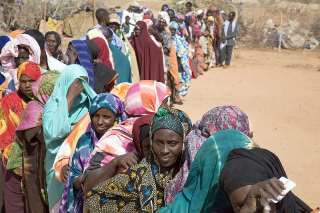Sudanese cabinet approves anti-human trafficking law
July 11, 2013 (KHARTOUM) – The Sudanese cabinet today endorsed a draft bill on combating human trafficking in line with previous government pledges to tackle the issue this year.

It lists religious values, respect for human dignity and international conventions as guidelines used in the drafting of the bill.
The deputy spokesman for the Sudanese Council of Ministers Hatem Hassan Bakhit told reporters that the law will prevent the exploitation of Sudanese citizens or having them fall into the hands of smugglers especially children, women and the elderly as well as workers employed in forced labour who are exposed to various forms of abuse.
Earlier this year the Vice-Chairman of the parliamentary subcommittee on Legislation and Justice Tahani Tour al-Diba said that the law they expect to receive punishes those involved with human trafficking with up to 20 years imprisonment.
The US state department 2012 report on human trafficking identifies Sudan as a “source, transit, and destination country for men, women, and children subjected to forced labor and sex trafficking”.
“The Government of Sudan does not fully comply with the minimum standards for the elimination of trafficking and is not making significant efforts to do so. While the government took some initial steps during the reporting period to acknowledge the existence of trafficking, draft anti-trafficking legislation, prosecute suspected traffickers, demobilize and reintegrate child soldiers, and waive overstay fines for foreign domestic workers, its efforts to combat human trafficking through law enforcement, protection, or prevention measures were undertaken in an ad hoc fashion, rather than as the result of strategic planning” the report said.
The US called on Khartoum to “enact a comprehensive legal regime to define and address human trafficking crimes and harmonize various existing legal statutes; increase efforts to investigate suspected human trafficking cases, increase prosecution of trafficking offenses, and convict and punish trafficking offenders”.
Eastern Sudan in particular is believed to be serving as a passage to migrants from Eritrea, Ethiopia and Somalia who seek to reach Europe with the help of human smugglers.
(ST)
